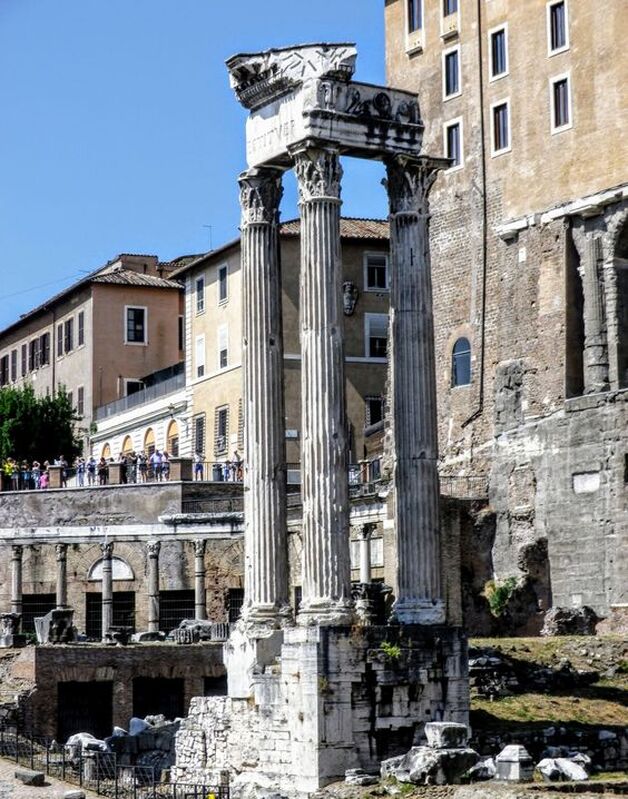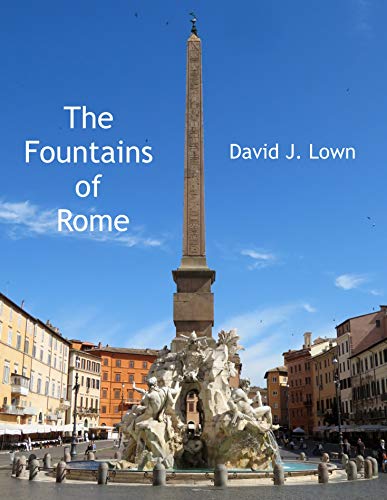- Home
- Walking Tours
- Blog
-
St Peter's Basilica
- Altars
- Baldacchino
- Chair of St Peter
- Chapel of the Baptistery
- Chapel of the Bl. Sacrament
- Chapel of the Choir
- Chapel of the Pieta
- Crossing >
- Dome
-
Monuments
>
- Countess Matilda of Canossa
- Maria Clementina Sobieska
- Queen Christina of Sweden
- Pope Innocent VIII
- Pope Paul III
- Pope Gregory XIII
- Pope Gregory XIV
- Pope Leo XI
- Pope Urban VIII
- Pope Alexander VII
- Pope Clement X
- Pope Innocent XI
- Pope Alexander VIII
- Pope Innocent XII
- Pope Benedict XIV
- Pope Clement XIII
- Pope Pius VII
- Pope Leo XII
- Pope Pius VIII
- Pope Gregory XVI
- Pope Pius X
- Pope Benedict XV
- Pope Pius XI
- Pope Pius XII
- Pope John XXIII
- The Stuarts
- Nave
- Portico >
- Statue of St Peter
- Statues of Founder Saints
- Transept
- Tribune
- St Peter's Square
- Vatican Museums
- Sistine Chapel
- On This Day in Rome
-
Fountains
- Fontana della Barcaccia
- Fontana di Piazza delle Scole
- Fountain of Moses
- Fountain of Neptune
- Fountains of Piazza Farnese
- Fountain of the Acqua Paola
- Fountain of the Bees
- Fountain of the Cannonball
- Fountain of the Four Rivers
- Fountain of the Goddess Roma
- Fountain of the Moor
- Fountain of the Naiads
- Fountain of the Pantheon
- Fountains of Piazza del Popolo
- Fountain of the Porter
- Fountains of St Peter's Square
- Fountain of the Seahorses
- Fountain of the Triton
- Fountain of the Turtles
- Four Fountains
- Rioni Fountains
- Street Fountains
- Trevi Fountain
- Venice Marries the Sea
-
Churches
- Chiesa del Gesù >
- Chiesa Nuova
- Lateran Baptistery
- San Bartolomeo all' Isola
- San Benedetto in Piscinula
- San Bernardo alle Terme
- San Carlo ai Catinari
- San Carlo al Corso
- San Carlo alle Quattro Fontane
- San Clemente >
- San Crisogono
- San Francesco a Ripa >
- San Giorgio in Velabro
- San Giovanni a Porta Latina
- San Giovanni dei Fiorentini
- San Giovanni in Laterano >
- San Girolamo della Carità >
- San Gregorio Magno
- San Lorenzo fuori le Mura
- San Lorenzo in Damaso
- San Lorenzo in Lucina
- San Luigi dei Francesi >
- San Marcello al Corso
- San Marco
- San Martino ai Monti
- San Nicola in Carcere
- San Pancrazio
- San Paolo fuori le Mura
- San Pietro in Montorio
- San Pietro in Vincoli
- San Saba
- San Salvatore in Lauro
- San Sebastiano fuori le Mura >
- San Silvestro in Capite
- San Vitale
- Sant' Agnese fuori le Mura
- Sant' Agnese in Agone
- Sant' Agostino
- Sant' Alessio
- Sant' Anastasia
- Sant' Andrea al Quirinale
- Sant' Andrea della Valle
- Sant' Andrea delle Fratte
- Sant' Antonio dei Portoghesi
- Sant' Apollinare
- Sant' Eustachio
- Sant' Ignazio di Loyola
- Sant' Ivo alla Sapienza
- Santa Caterina dei Funari
- Santa Cecilia in Trastevere
- Santa Costanza
- Santa Croce in Gerusalemme >
- Santa Francesca Romana
- Santa Maria ad Martyres
- Santa Maria degli Angeli
- Santa Maria dei Miracoli
- Santa Maria del Popolo >
- Santa Maria del Priorato
- Santa Maria della Pace >
- Santa Maria della Vittoria >
- Santa Maria dell' Anima
- Santa Maria dell' Orazione e Morte
- Santa Maria dell' Orto
- Santa Maria di Loreto
- Santa Maria in Aracoeli >
- Santa Maria in Campitelli
- Santa Maria in Cosmedin
- Santa Maria in Domnica
- Santa Maria in Montesanto
- Santa Maria in Trastevere >
- Santa Maria in Via
- Santa Maria in Via Lata
- Santa Maria Maddalena
- Santa Maria Maggiore >
- Santa Maria sopra Minerva >
- Santa Prassede
- Santa Pudenziana
- Santa Sabina >
- Santa Susanna
- Santi Apostoli
- Santi Cosma e Damiano
- Santi Domenico e Sisto
- Santi Giovanni e Paolo
- Santi Luca e Martina
- Santi Nereo e Achilleo
- Santi Quattro Coronati
- Santi Vincenzo e Anastasio
- Santissima Trinità degli Spagnoli
- Santissima Trinità di Monti
- Santissimo Nome di Maria
- Santo Stefano Rotondo
- Palatine
- Forum
-
Ancient Monuments
- Aqueducts
- Ara Pacis
- Arch of Constantine
- Arch of the Money-Changers
- Arch of Janus
- Aurelian Walls
- Baths of Caracalla
- Baths of Diocletian
- Castel Sant' Angelo
- Catacombs of Domitilla
- Circus Maxentius
- Circus Maximus
- Colosseum
- Column of Marcus Aurelius
- Column of Trajan
- Forum of Augustus
- Forum of Trajan
- Mausoleum of Augustus
- Nymphaeum
- Pantheon
- Ponte Fabricio
- Ponte Milvio
- Ponte Rotto
- Ponte Sant' Angelo
- Porta Maggiore
- Porta San Paolo
- Porta San Sebastiano
- Portico of Octavia
- Pyramid of Cestius
- Temple of Hadrian
- Temple of Hercules
- Temple of Portunus
- Theatre of Balbus
- Theatre of Marcellus
- Theatre of Pompey
- Tomb of Caecilia Metella
- Via Appia
-
Obelisks
- 'Minerveo' Obelisk
- 'Flaminio' Obelisk
- 'Matteiano' Obelisk
- 'Lateran' Obelisk
- 'Dogali' Obelisk
- 'Macuteo' Obelisk
- 'Solare' Obelisk
- 'Vatican' Obelisk
- 'Agonalis' Obelisk
- 'Sallustiano' Obelisk
- 'Quirinale' Obelisk
- 'Esquiline' Obelisk
- 'Pinciano' Obelisk
- 'Mediceo' Obelisk
- 'Torlonia' Obelisks
- 'Mussolini' Obelisk
- 'Marconi' Obelisk
-
Mosaics
- Gallery
- Palazzi
- Galleries & Museums
- Piazzas
-
Miscellaneous
- A Calendar of Saints
- A Literary Tour
- Antico Caffè Greco
- Art of the Cosmati
- Babington's Tea Rooms
- Barberini Bees
- Gian Lorenzo Bernini
- Borromini & the Baroque
- Catacombs
- Column of the Immaculate Conception
- Domes
- Equestrian Statues
- EUR
- Fasces
- Flood Plaques
- Funerary Monuments
- House of the Owls
- Jewish Ghetto
- Jubilee Years
- Knights of Malta
- Mithraism
- Monumental Complex of S. Spirito in Sassia
- Ponte Sisto
- 'Protestant' Cemetery
- Quartiere Coppedè
- Spanish Steps
- 'Talking' Statues
- Tiber Island
- Villa Borghese
- Vittoriano
- Rioni
- On This Day in Italy
-
Pictures from Italy
-
Florence
>
- A Literary Tour
- Anna Maria Luisa: Last of the Medici
- Casa-Galleria Vichi
- Column of Justice
- Column of St Zenobius
- Cosimo I de' Medici
- Cosimo II de' Medici
- Costanza Bonarelli
- David With Fig Leaf
- Elizabeth Barrett Browning
- Equestrian Statue of Cosimo I de' Medici
- Equestrian Statue of Ferdinando I de' Medici
- Festina Lente
- Floods
- Fontana del Bacchino
- Fontana dei Puttini
- Fountain of Neptune
- Fountains of the Marine Monsters
- Gian Gastone de' Medici
- Girolamo Savonarola
- Images of the Annunciation
- Little Devil
- Monument to Cellini
- Palazzo Bartolini-Salimbeni
- Palazzo Bianca Cappello
- Palazzo Fenzi
- Palazzo Viviani
- Perseus and Medusa
- Piazza Santa Maria Novella
- Pope Leo XI
- Porta della Mandorla
- Rape of the Sabine Woman
- Santa Maria Novella
- Canons' Palace
- Statue of Dante
- Theft of the Century
- Torre del Arnolfo
- Twelve Good Men
- Villa Gamberaia
- Wheel of the Innocents
- 'Wine Windows'
- Lazio >
- Tuscany >
-
Venice
>
- Ab Urbe Condita
- Acqua Alta
- Bartolomeo Colleoni
- Barque of Dante
- Burano
- Caffè Florian
- Daniele Manin
- Flagpoles
- Giustina Rossi
- Gondolas
- Harry's Bar
- Henry James
- House of Three Eyes
- King Victor Emmanuel II
- Map of Venice
- Martinmas
- Master of the House
- Palazzo Contarini Fasan
- Ponte Borgoloco
- Ponte Chiodo
- Punta del Dogana
- Scacciadiavoli
- Shrine of St Lucia
- Sior Antonio Rioba
- The 'Book Shitter'
- The Lion's Mouth
- Tommaso Rangone
- Torcello
- Venus
- 'Viennese Oranges'
- Wellheads
- Winged Lions
-
Florence
>
- Popes: 1417-Present
- Cloisters
|
The legacies of the emperor Vespasian (r. 69-79) are many and diverse. He built the largest amphitheatre in the world; he also gave his name (albeit involuntarily) to the public urinal in Italy.
How such an object came to be named after a Roman emperor is an interesting story and it starts off with a tale told by Gaius Suetonius Tranquillus (69-130) in his book De Vita Caesarum (Lives of the Caesars). Vespasian introduced a tax on the collection of urine, a valuable commodity in that it contains ammonia, which was used to clean clothes. When Vespasian's eldest son and heir, Titus, questioned whether this was an honourable way of making money his father is said to have held a coin up to his son's nose, asking if it smelt of anything! Titus had to conclude that 'pecunia non olet' ('money has no smell'). The phrase is still used to argue that the value of money is not tainted by its origins. On account of this story, a public urinal (orinatoio) came to be known in Italy as a vespasiano. Vespasian was deified after his death and his son and successor Titus (r. 79-81) commissioned a temple to be raised to him in the Forum. Titus died two years later and he, too, was deified. The temple was completed by his brother the emperor Domitian (r. 81-96) and dedicated to both Vespasian and Titus. All that remains of are three Corinthian columns. The custom of turning emperors into gods began with Augustus. A few months short of his seventieth year Vespasian fell ill. As his illness worsened, and feeling the approach of death, the emperor is supposed to have called out 'Vae, puto deus fio' ('Dear me, I think I'm becoming a god'). Comments are closed.
|
My name is David Lown and I am an art historian from Cambridge, England. Since 2001 I have lived in Italy, where I run private walking tours of Rome.
Search Walks in Rome:
Most Popular Posts
Archives
April 2024
|
- Home
- Walking Tours
- Blog
-
St Peter's Basilica
- Altars
- Baldacchino
- Chair of St Peter
- Chapel of the Baptistery
- Chapel of the Bl. Sacrament
- Chapel of the Choir
- Chapel of the Pieta
- Crossing >
- Dome
-
Monuments
>
- Countess Matilda of Canossa
- Maria Clementina Sobieska
- Queen Christina of Sweden
- Pope Innocent VIII
- Pope Paul III
- Pope Gregory XIII
- Pope Gregory XIV
- Pope Leo XI
- Pope Urban VIII
- Pope Alexander VII
- Pope Clement X
- Pope Innocent XI
- Pope Alexander VIII
- Pope Innocent XII
- Pope Benedict XIV
- Pope Clement XIII
- Pope Pius VII
- Pope Leo XII
- Pope Pius VIII
- Pope Gregory XVI
- Pope Pius X
- Pope Benedict XV
- Pope Pius XI
- Pope Pius XII
- Pope John XXIII
- The Stuarts
- Nave
- Portico >
- Statue of St Peter
- Statues of Founder Saints
- Transept
- Tribune
- St Peter's Square
- Vatican Museums
- Sistine Chapel
- On This Day in Rome
-
Fountains
- Fontana della Barcaccia
- Fontana di Piazza delle Scole
- Fountain of Moses
- Fountain of Neptune
- Fountains of Piazza Farnese
- Fountain of the Acqua Paola
- Fountain of the Bees
- Fountain of the Cannonball
- Fountain of the Four Rivers
- Fountain of the Goddess Roma
- Fountain of the Moor
- Fountain of the Naiads
- Fountain of the Pantheon
- Fountains of Piazza del Popolo
- Fountain of the Porter
- Fountains of St Peter's Square
- Fountain of the Seahorses
- Fountain of the Triton
- Fountain of the Turtles
- Four Fountains
- Rioni Fountains
- Street Fountains
- Trevi Fountain
- Venice Marries the Sea
-
Churches
- Chiesa del Gesù >
- Chiesa Nuova
- Lateran Baptistery
- San Bartolomeo all' Isola
- San Benedetto in Piscinula
- San Bernardo alle Terme
- San Carlo ai Catinari
- San Carlo al Corso
- San Carlo alle Quattro Fontane
- San Clemente >
- San Crisogono
- San Francesco a Ripa >
- San Giorgio in Velabro
- San Giovanni a Porta Latina
- San Giovanni dei Fiorentini
- San Giovanni in Laterano >
- San Girolamo della Carità >
- San Gregorio Magno
- San Lorenzo fuori le Mura
- San Lorenzo in Damaso
- San Lorenzo in Lucina
- San Luigi dei Francesi >
- San Marcello al Corso
- San Marco
- San Martino ai Monti
- San Nicola in Carcere
- San Pancrazio
- San Paolo fuori le Mura
- San Pietro in Montorio
- San Pietro in Vincoli
- San Saba
- San Salvatore in Lauro
- San Sebastiano fuori le Mura >
- San Silvestro in Capite
- San Vitale
- Sant' Agnese fuori le Mura
- Sant' Agnese in Agone
- Sant' Agostino
- Sant' Alessio
- Sant' Anastasia
- Sant' Andrea al Quirinale
- Sant' Andrea della Valle
- Sant' Andrea delle Fratte
- Sant' Antonio dei Portoghesi
- Sant' Apollinare
- Sant' Eustachio
- Sant' Ignazio di Loyola
- Sant' Ivo alla Sapienza
- Santa Caterina dei Funari
- Santa Cecilia in Trastevere
- Santa Costanza
- Santa Croce in Gerusalemme >
- Santa Francesca Romana
- Santa Maria ad Martyres
- Santa Maria degli Angeli
- Santa Maria dei Miracoli
- Santa Maria del Popolo >
- Santa Maria del Priorato
- Santa Maria della Pace >
- Santa Maria della Vittoria >
- Santa Maria dell' Anima
- Santa Maria dell' Orazione e Morte
- Santa Maria dell' Orto
- Santa Maria di Loreto
- Santa Maria in Aracoeli >
- Santa Maria in Campitelli
- Santa Maria in Cosmedin
- Santa Maria in Domnica
- Santa Maria in Montesanto
- Santa Maria in Trastevere >
- Santa Maria in Via
- Santa Maria in Via Lata
- Santa Maria Maddalena
- Santa Maria Maggiore >
- Santa Maria sopra Minerva >
- Santa Prassede
- Santa Pudenziana
- Santa Sabina >
- Santa Susanna
- Santi Apostoli
- Santi Cosma e Damiano
- Santi Domenico e Sisto
- Santi Giovanni e Paolo
- Santi Luca e Martina
- Santi Nereo e Achilleo
- Santi Quattro Coronati
- Santi Vincenzo e Anastasio
- Santissima Trinità degli Spagnoli
- Santissima Trinità di Monti
- Santissimo Nome di Maria
- Santo Stefano Rotondo
- Palatine
- Forum
-
Ancient Monuments
- Aqueducts
- Ara Pacis
- Arch of Constantine
- Arch of the Money-Changers
- Arch of Janus
- Aurelian Walls
- Baths of Caracalla
- Baths of Diocletian
- Castel Sant' Angelo
- Catacombs of Domitilla
- Circus Maxentius
- Circus Maximus
- Colosseum
- Column of Marcus Aurelius
- Column of Trajan
- Forum of Augustus
- Forum of Trajan
- Mausoleum of Augustus
- Nymphaeum
- Pantheon
- Ponte Fabricio
- Ponte Milvio
- Ponte Rotto
- Ponte Sant' Angelo
- Porta Maggiore
- Porta San Paolo
- Porta San Sebastiano
- Portico of Octavia
- Pyramid of Cestius
- Temple of Hadrian
- Temple of Hercules
- Temple of Portunus
- Theatre of Balbus
- Theatre of Marcellus
- Theatre of Pompey
- Tomb of Caecilia Metella
- Via Appia
-
Obelisks
- 'Minerveo' Obelisk
- 'Flaminio' Obelisk
- 'Matteiano' Obelisk
- 'Lateran' Obelisk
- 'Dogali' Obelisk
- 'Macuteo' Obelisk
- 'Solare' Obelisk
- 'Vatican' Obelisk
- 'Agonalis' Obelisk
- 'Sallustiano' Obelisk
- 'Quirinale' Obelisk
- 'Esquiline' Obelisk
- 'Pinciano' Obelisk
- 'Mediceo' Obelisk
- 'Torlonia' Obelisks
- 'Mussolini' Obelisk
- 'Marconi' Obelisk
-
Mosaics
- Gallery
- Palazzi
- Galleries & Museums
- Piazzas
-
Miscellaneous
- A Calendar of Saints
- A Literary Tour
- Antico Caffè Greco
- Art of the Cosmati
- Babington's Tea Rooms
- Barberini Bees
- Gian Lorenzo Bernini
- Borromini & the Baroque
- Catacombs
- Column of the Immaculate Conception
- Domes
- Equestrian Statues
- EUR
- Fasces
- Flood Plaques
- Funerary Monuments
- House of the Owls
- Jewish Ghetto
- Jubilee Years
- Knights of Malta
- Mithraism
- Monumental Complex of S. Spirito in Sassia
- Ponte Sisto
- 'Protestant' Cemetery
- Quartiere Coppedè
- Spanish Steps
- 'Talking' Statues
- Tiber Island
- Villa Borghese
- Vittoriano
- Rioni
- On This Day in Italy
-
Pictures from Italy
-
Florence
>
- A Literary Tour
- Anna Maria Luisa: Last of the Medici
- Casa-Galleria Vichi
- Column of Justice
- Column of St Zenobius
- Cosimo I de' Medici
- Cosimo II de' Medici
- Costanza Bonarelli
- David With Fig Leaf
- Elizabeth Barrett Browning
- Equestrian Statue of Cosimo I de' Medici
- Equestrian Statue of Ferdinando I de' Medici
- Festina Lente
- Floods
- Fontana del Bacchino
- Fontana dei Puttini
- Fountain of Neptune
- Fountains of the Marine Monsters
- Gian Gastone de' Medici
- Girolamo Savonarola
- Images of the Annunciation
- Little Devil
- Monument to Cellini
- Palazzo Bartolini-Salimbeni
- Palazzo Bianca Cappello
- Palazzo Fenzi
- Palazzo Viviani
- Perseus and Medusa
- Piazza Santa Maria Novella
- Pope Leo XI
- Porta della Mandorla
- Rape of the Sabine Woman
- Santa Maria Novella
- Canons' Palace
- Statue of Dante
- Theft of the Century
- Torre del Arnolfo
- Twelve Good Men
- Villa Gamberaia
- Wheel of the Innocents
- 'Wine Windows'
- Lazio >
- Tuscany >
-
Venice
>
- Ab Urbe Condita
- Acqua Alta
- Bartolomeo Colleoni
- Barque of Dante
- Burano
- Caffè Florian
- Daniele Manin
- Flagpoles
- Giustina Rossi
- Gondolas
- Harry's Bar
- Henry James
- House of Three Eyes
- King Victor Emmanuel II
- Map of Venice
- Martinmas
- Master of the House
- Palazzo Contarini Fasan
- Ponte Borgoloco
- Ponte Chiodo
- Punta del Dogana
- Scacciadiavoli
- Shrine of St Lucia
- Sior Antonio Rioba
- The 'Book Shitter'
- The Lion's Mouth
- Tommaso Rangone
- Torcello
- Venus
- 'Viennese Oranges'
- Wellheads
- Winged Lions
-
Florence
>
- Popes: 1417-Present
- Cloisters



